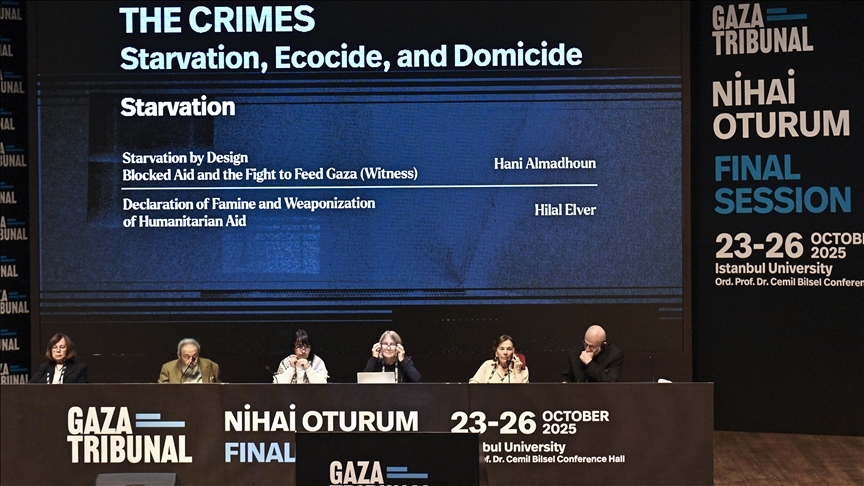UK psychotherapist warns Gaza faces ‘trauma’ beyond calculation as support systems collapse
At Gaza Tribunal in Istanbul, Gwyn Daniel warns destruction of family networks, schools and clinics has turned mental injuries into struggle for survival

ISTANBUL
The genocide in Gaza has led to psychological harm so vast and layered that its long-term consequences are still impossible to measure, a leading UK trauma expert told Anadolu on the sidelines of the Gaza Tribunal in Istanbul.
Gwyn Daniel, a psychotherapist, trainer and writer from the UK, and a member of the UK Palestine Mental Health Network as well as a patron of the Palestine Trauma Centre, stressed that the destruction of Gaza’s social fabric has turned what could normally be treated as mental health injuries into a crisis of survival.
“The first point I want to make is that this genocide is having effects on the population that we simply cannot calculate because it is of such an immensity,” Daniel said. “There are so many levels at which people are traumatized which include clearly the individual trauma of bombardment, mutilation and the loss of family members and the witnessing of shredded bodies.”
Beyond acute terror, she said, systemic devastation has stripped civilians of the support traditionally provided by community life.
“There is the massive onslaught on the community of all the protective community mechanisms, extended families, mosques, schools have been demolished,” she added. “So there is very little that protects civilians from the trauma and there is very little help available to them.”
Daniel emphasized that while survivors urgently need psychosocial support, reliance on outside actors is fraught given that “the world has abandoned the people of Gaza.”
“The best people to help the citizens of Gaza are the services that operate within Gaza,” she said.
She cited the Palestine Trauma Centre — where she collaborates — and the Gaza Community Mental Health Programme, noting that “most of whose clinics have been destroyed but they are still working.”
- ‘Children are not collateral damage’
Daniel said patterns observed by mental health workers and documented testimonies point to a strategy aimed not just at killing people but destroying their future.
“We know that the intention is to destroy Gaza. We know that the intention is to punish and take vengeance on the people of Gaza,” she said, describing the repeated targeting of health facilities and personnel. While she could not confirm that mental health clinics were singled out, she noted “the clinics that I know that have been serving the people of Gaza have been destroyed.”
Her greatest alarm centered on children. “Children are not, in that terrible phrase, collateral damage,” Daniel said. “Children are attacked by sniper fire. Children are the victims of bombardments.”
She warned of irreversible physical and psychological harm caused by widespread starvation. “Fragile children’s bodies cannot recover from malnutrition because they are at a stage of their growth when their growth will be stunted, sadly, for the rest of their lives,” she said.
“There is evidence that children have been deliberately targeted, shot in the head and in other parts of the body.”
In settler-colonial systems, she added, “children are not intended to have a future on their own land,” which is why she believes they are being systematically attacked.
- Mental health care ‘in the rubble’
With no prospects yet for recovery, Daniel said local mental health professionals are creating pockets of support amid the devastation.
“They are working in the rubble, in tents, in damaged buildings,” she said. In the absence of safety or infrastructure, practitioners focus heavily on children — helping them draw, speak or “find any way of expressing their experiences” so that trauma does not remain locked in their minds.
Parents are also supported through group counseling because “collective solidarity is what is needed.”
Turning to responsibilities of the global mental health field, she outlined three urgent actions: “One is to support the work of the people in Gaza,” she said, noting the many student psychologists who could quickly be trained.
Secondly, professional organizations must reject silence. Mental health bodies — especially those dedicated to children — should “make statements condemning this genocide,” she said, describing the current lack of such statements as “shameful.”
Finally, she said the international community must advocate for the basic conditions required for trauma recovery: “To be safe, to be believed, to have witnesses believing your experience, to recover a sense of power and agency, to have justice, to have accountability and to have restitution.”
“None of those things are present,” Daniel said. “But that's what we must push for. Because we have to understand mental health recovery in the context of a much wider political solution.”
- Gaza Tribunal
The four-day public session at Istanbul University from Thursday to Sunday marks the culmination of a year-long effort by international jurists, scholars and civil society figures to document Israel's crimes committed against Palestinians.
Saturday's sessions of the Tribunal focused on complicity, international systems, resistance, and solidarity.
Presided over by Richard Falk, former UN special rapporteur on human rights in the Palestinian territories, the tribunal aims to produce a comprehensive “people’s record” of what participants describe as genocide, apartheid and systemic violations of international law in Gaza.
The tribunal’s jury of conscience includes Kenize Mourad, Christine Chinkin, Chandra Muzaffar, Ghada Karmi, Sami Al-Arian and Biljana Vankovska.
Its panel of jurists and observers is expected to issue a final opinion on Sunday, summarizing findings on genocide, apartheid, and systemic violations in Gaza.
Anadolu Agency website contains only a portion of the news stories offered to subscribers in the AA News Broadcasting System (HAS), and in summarized form. Please contact us for subscription options.







